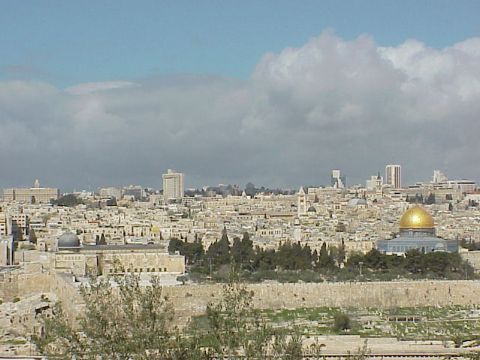
|
|
|
|

|
Next Year in Jerusalem
A Christmas Meditation
For the Church of Jesus Christ Incarcerated
December 10, 2006
By Philip D. Ropp
|
L’shana ha’ba-ah b’Yerushalayim. "Next year in
Jerusalem." This is a Passover prayer that has sustained
the Jewish people for two thousand years. In its historical context, it
hearkens back to the social and religious trauma experienced by the
Jews at the
destruction of the Temple in Jerusalem by the Romans in the year 70
AD. Dispersed throughout the world,
subjected to the harshest realities of political, social and religious
persecution, this simple phrase came to symbolize the hope, belief and
ultimate
trust in the deliverance and salvation of God.
Our Christian celebration of the birth of the
Child
Jesus at Christmas is also a time filled with hope for a future in
which human
suffering has been eliminated: Eliminated by a God that cares enough to
become
one of us so that he might offer Himself up to this human suffering. It
is
through this greatest of all acts of love that we become one with Him
and so
learn by this example how he expects us to relate to one another. And
so Jesus
tells us in John 15:13, “No one has greater love than this, to lay down
one’s
life for one’s friends.”
During the earliest centuries of the Church,
there
was a common Christian teaching called the “Harrowing of Hell.”
This tradition is related in the apocryphal
Gospel of Nicodemus. It is the story of how Jesus, during the three
days in the
tomb after the crucifixion, entered into the realm of the underworld to
rescue
the souls of the dead. It is a story that illustrates that the Lord
does indeed
remember those in even the most hopeless of all human circumstances,
and that
death itself is not prison enough to keep God from finding and reaching
out to
those that belong to Him.
“I’ll be Home for Christmas” is a song of
the season
that we all grew up with. It was written by Walter Kent and became one
of Bing
Crosby’s biggest hits during the Christmas season of 1943. During
these darkest days of World War II,
when families were separated by the stark reality of a war that seemed
like it
would never end, this song struck a heart-wrenching chord in the
American
psyche. To this day, it remains a holiday favorite because the themes
of home
and hearth, family and friends, love and sharing at Christmas form a
timeless
tradition that is precious to each of us.
To be separated at this special time of year creates a longing that is
indescribable and a yearning to be free of whatever bonds may be
keeping us
from those that bring that special joy of love to our lives. And
so in our hearts each of us can relate
that, “I’ll be home for Christmas, if only in my dreams.”
There is much that has been written about the
symbolic meaning of Jerusalem
in scripture. There are commentaries six
inches thick that ponder this question from every possible angle and in
the
most comprehensive of terms. Yet in
reality the meaning expressed in this image of the holy and eternal
city of God is so utterly simple
that it is amazing that so many so often miss the point. It
simply means “home.” The impassioned cry of the Jewish people at
Passover, “Next Year in Jerusalem,”
is purely and simply an expression of the undying hope and heartfelt
belief
that the next time we celebrate, we will be at home and we will be
together.
During this special time of the year there
always seems to be so much to distract us from the “reason for the
season.” Tinsel and garland, song and
revelry, food and football all have their place; yet in these darkest
days of
the year, we would do well to remember that it is at this time that God
draws
nearest to us in the person of the Christ child. It is a holy time of
year that
we can, perhaps, best benefit from through increased prayer and
meditation. As
God draws nearer to us, let us respond by drawing nearer to him. Like
the
apostle John, let us lay our head upon the breast of the Master and
unburden
ourselves of all the human cares that form the real shackles that bind
us. Let us do this in all sincerity and know he
hears our prayer: “Next year in Jerusalem.”
|
|
|